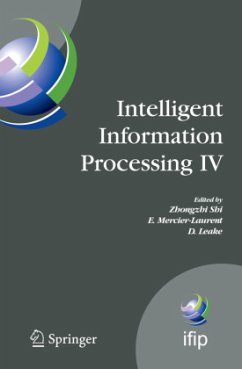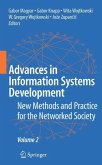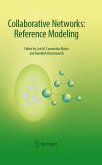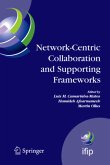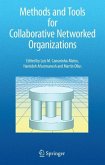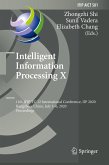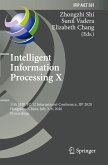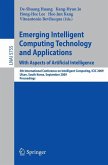This book constitutes the proceedings of the 5th IFIP International Conference on Intelligent Information Processing in Beijing, China, 2008.
The IFIP series publishes state-of-the-art results in the sciences and technologies of information and communication. The scope of the series includes: foundations of computer science; software theory and practice; education; computer applications in technology; communication systems; systems modeling and optimization; information systems; computers and society; computer systems technology; security and protection in information processing systems; artificial intelligence; and human-computer interaction. Proceedings and post-proceedings of refereed international conferences in computer science and interdisciplinary fields are featured. These results often precede journal publication and represent the most current research. The principal aim of the IFIP series is to encourage education and the dissemination and exchange of information about all aspects of computing.
Knowledge existing in modern information systems usually comes from many sources and is mapped in many ways. There is a real need for representing "knowledge pieces" as rather universal objects that should fit to multi-purpose a- ing systems. According to great number of information system's tasks, knowledge representation is more or less detailed (e.g. some level of its granularity is - sumed). The main goal of this paper is to present chosen aspects of expressing granularity of knowledge implemented in intelligent systems. One of the main r- sons of granularity phenomena is diversification of knowledge sources, therefore the next section is devoted to this issue. 2. Heterogeneous Knowledge as a Source for Intelligent Systems Knowledge, the main element of so-called intelligent applications and systems, is very often heterogeneous. This heterogeneity concerns the origin of knowledge, its sources as well as its final forms of presentation. In this section the selected c- teria ofknowledge differentiation will be presented, in the context of potential sources of knowledge acquisition. In Fig. 1 an environment of intelligent systems is shown, divided into different knowledge sources for the system. Fig. 1. Potential knowledge sources for intelligent information/reasoning system. Source: own elaboration based on (Mach, 2007) p. 24.
The IFIP series publishes state-of-the-art results in the sciences and technologies of information and communication. The scope of the series includes: foundations of computer science; software theory and practice; education; computer applications in technology; communication systems; systems modeling and optimization; information systems; computers and society; computer systems technology; security and protection in information processing systems; artificial intelligence; and human-computer interaction. Proceedings and post-proceedings of refereed international conferences in computer science and interdisciplinary fields are featured. These results often precede journal publication and represent the most current research. The principal aim of the IFIP series is to encourage education and the dissemination and exchange of information about all aspects of computing.
Knowledge existing in modern information systems usually comes from many sources and is mapped in many ways. There is a real need for representing "knowledge pieces" as rather universal objects that should fit to multi-purpose a- ing systems. According to great number of information system's tasks, knowledge representation is more or less detailed (e.g. some level of its granularity is - sumed). The main goal of this paper is to present chosen aspects of expressing granularity of knowledge implemented in intelligent systems. One of the main r- sons of granularity phenomena is diversification of knowledge sources, therefore the next section is devoted to this issue. 2. Heterogeneous Knowledge as a Source for Intelligent Systems Knowledge, the main element of so-called intelligent applications and systems, is very often heterogeneous. This heterogeneity concerns the origin of knowledge, its sources as well as its final forms of presentation. In this section the selected c- teria ofknowledge differentiation will be presented, in the context of potential sources of knowledge acquisition. In Fig. 1 an environment of intelligent systems is shown, divided into different knowledge sources for the system. Fig. 1. Potential knowledge sources for intelligent information/reasoning system. Source: own elaboration based on (Mach, 2007) p. 24.

